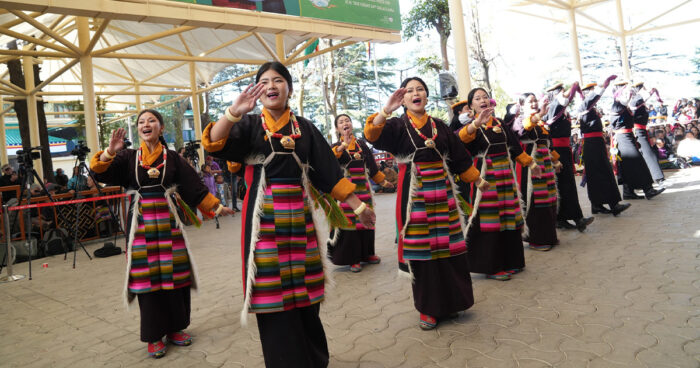
The 75th anniversary of the UN Universal Declaration of Human Rights brought worldwide protests against China’s human rights abuses in Tibet, as well as celebrations of the 34th anniversary of the Dalai Lama’s Nobel Peace Prize.
On Dec. 10, 1948, the UN General Assembly adopted the Universal Declaration of Human Rights, which, for the first time in history, set forth fundamental human rights for all people. Dec. 10 is now known as Human Rights Day.
On that same date in 1989, the Norwegian Nobel Committee presented the Nobel Peace Prize to His Holiness the Dalai Lama in recognition of his nonviolent opposition to China’s occupation of Tibet.
With the occupation continuing to grow more brutal, Tibetans and their supporters took part in demonstrations around the world against the Chinese government, while foreign officials condemned China’s abuses.
At the same time, Tibetans celebrated the anniversary of their spiritual leader’s Nobel Prize.
“We pray for the long life of His Holiness the Dalai Lama so that He can spend the rest of his life for the promotion of world peace and moral values,” the Tibetan Kashag (cabinet) said in a statement.
“May truth and the non-violent cause of Tibet prevail.”
Celebrations in exile
In the Dalai Lama’s exile home of Dharamsala, India, hundreds of people gathered in the courtyard of the Tsuglagkhang temple for a celebration organized by the Central Tibetan Administration.
The event featured performances by artists from the Tibetan Institute for Performing Arts and schoolchildren from Dharamsala.
During the celebration, the CTA, which provides democratic governance for Tibetans in exile, congratulated and awarded several Tibetan public servants.
The Tibetan Sikyong (President) Penpa Tsering read the statement from the Kashag, while Speaker Khenpo Sonam Tenphel read a statement from the Tibetan Parliament-in-Exile.
Human rights abuses in Tibet
Amid the revelry, speakers at the event also called out China’s shocking human rights violations in Tibet.
These violations include a state-run boarding school system that has separated over 1 million Tibetan children from their families, language and culture.
The boarding schools are part of China’s growing campaign of “Sinification”—an effort to erase Tibetans’ unique identity and force them to assimilate into Chinese culture.
Recently, the Chinese government has even begun replacing the name “Tibet” with the Chinese-language word “Xizang.”
China has occupied Tibet for over 60 years, forcing the Dalai Lama into exile in 1959. Tibet now ranks as the least-free country on Earth alongside South Sudan and Syria, according to the watchdog group Freedom House.
The Chinese government held 10 rounds of dialogue with His Holiness’ envoys from 2002-10 but has refused to negotiate with Tibetan leaders since then.
Criticism of China
To mark Human Rights Day, Nicholas Burns, the US ambassador to China, released a statement condemning China’s “human rights abuses against Tibetans and its brutal campaign to eliminate Tibet’s unique cultural, linguistic, and ethnic identity.”
“We call on the [People’s Republic of China] to examine its human rights practices and uphold its international human rights obligations and the commitments it has made to its own people,” Burns said.
My statement on #HumanRightsDay2023 underscores U.S. support for human rights and condemns the PRC’s abuses in Xinjiang, Tibet, and Hong Kong, and detention of those who speak out. We call on Beijing to live up to its human rights obligations. https://t.co/Pwn5VCVuEO
— Ambassador Nicholas Burns (@USAmbChina) December 11, 2023
Tibetans and Tibet supporters also took part in protests and events for Human Rights Day around the world, including Canberra; Tokyo; London; and San Francisco. Many of these events also included representatives of the Uyghur, Mongolian, Hong Konger and other communities oppressed by the Chinese government.
In Amsterdam, Wangpo Tethong, the executive director of the International Campaign for Tibet Europe, spoke at a rally on the Dam organized by Tibetans, Hong Kongers, Uyghurs and Southern Mongolian groups. He emphasized the need for courage and the important spirit of reconciliation to safeguard human rights not only in Tibet but also globally.
ICT Germany Executive Director Kai Mueller also spoke at a joint rally by Tibetans, Hong Kongers and Chinese democracy activists in Berlin.
Dalai Lama Nobel Prize anniversary
At the same time, Tibetans and their friends held celebrations around the globe to mark the anniversary of His Holiness’ Nobel Prize.
Celebrations took place in Darjeeling, India; Geneva, Switzerland; Jaipur, India; Washington, DC; and elsewhere.
As for the Dalai Lama himself, the revered spiritual leader traveled over the weekend to the Indian state of Sikkim to deliver teachings.
Watch the Dalai Lama’s Nobel Peace Prize anniversary celebration in Dharamsala, India.

